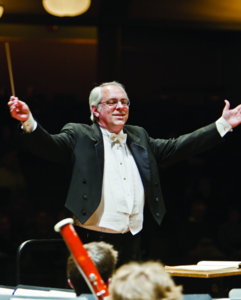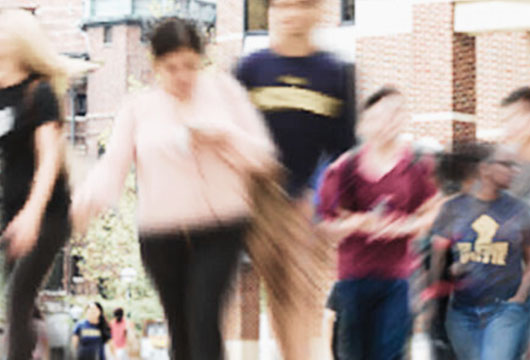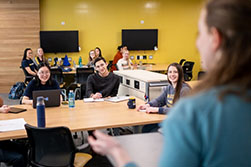| Friday Profile: Thurnau Professor Steve Skerlos Wed, 11/28/2012 Steve Skerlos, Thurnau Professor of Mechanical Engineering, has become so well known among his colleagues as a deeply engaged and innovative teacher that his name has become for many of them a synonym for pedagogical success. His department has developed their own playful terminology: a “Skerlosian Effort” indicates a high score on the “Skerlosian Scale” of teaching effectiveness. 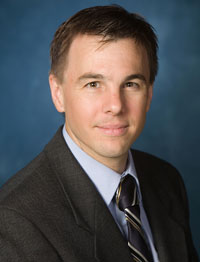 Professor Skerlos’s own Skerlosian Efforts are many and lasting; students past and present enthusiastically describe the long-term impact he has had on their academic and professional lives. In describing his teaching, they regularly mention his passion, his ability to teach to a range of learning styles, and his sensitive mentoring. Students and colleagues alike praise Skerlos’s model of “learning through doing”—his drive to enable students to become engineers by working as engineers, side-by-side with their professor. Professor Skerlos’s own Skerlosian Efforts are many and lasting; students past and present enthusiastically describe the long-term impact he has had on their academic and professional lives. In describing his teaching, they regularly mention his passion, his ability to teach to a range of learning styles, and his sensitive mentoring. Students and colleagues alike praise Skerlos’s model of “learning through doing”—his drive to enable students to become engineers by working as engineers, side-by-side with their professor.Professor Skerlos sparks and fosters student passion partly by emphasizing the potential of good engineering to do good in the world. He has put sustainability at the center of undergraduate education in engineering, co-creating key programs and specializations in Sustainable Engineering, Global Health Design, and Sustainable Water and Energy. The Program in Sustainable Engineering, where Skerlos is now Director, has a 9-credit specialized study in sustainable engineering. The program is working towards educating all undergraduate engineers in sustainability awareness and how they can act positively in the field through design. Through the work of BLUElab, a student-run program he co-founded, Skerlos has cultivated student interest in sustainability by mentoring and collaborating with student teams on projects that seek to, for instance, recover heat from residential shower water and convert farm waste to bioenergy.
Read more |
|
| Spotlight on Instructional Technology: How Can Online Collaboration Tools Enhance Teaching? Tue, 11/27/2012 Online collaboration tools, such as Google Apps, are revolutionizing workplace productivity and teamwork. These technologies also provide tremendous opportunities to enhance teaching, learning, and course management. Because keeping up with the evolution of new instructional technologies can be challenging, CRLT has posted some new resources focused on U-M teachers who are successfully integrating these tools into their courses:
And here are several other resources we provide to support your effective use of instructional technologies: Read more |
|
| Good Reads: Hacking Teaching Mon, 11/19/2012
For some more general information about how the volume came together, check out the Preface to Hacking the Academy. The printed book is also forthcoming from the University of Michigan Press. Read more |
|
| Friday Profile: Thurnau Professor Sadashi Inuzuka Fri, 11/16/2012 When Thurnau Professor of Art Sadashi Inuzuka visited a colleague’s performance studies class to give a guest lecture, he began by handing each student a chunk of clay to work while he talked. The gift of clay invited students to engage their bodies in the process of thinking about land and their physical connection to it—an invitation they delightedly accepted as they kneaded the lumps into small forms that Inuzuka later fired and returned to them. Inuzuka is internationally renowned as an artist whose sculptures powerfully explore the relationships between humans and the natural world. But he is equally renowned among U-M colleagues and students as a remarkable teacher who can guide students, through such simple acts as handing them clay, to deeply embodied insights about the transformative social power of art.
The sheer breadth of Inuzuka’s teaching speaks to his flexibility as a teacher. But whether through his innovative drawing workshops for first-year medical students (designed to develop skills of observation as well as a comfort with loss of control), or his interdisciplinary course on environmental concerns in the Great Lakes region, Professor Inuzuka’s teaching consistently reflects two core pedagogical principles:
Inuzuka’s enactment of these ideas is perhaps best illustrated by the innovative ways he has connected the School of Art & Design to Southeast Michigan’s low-vision community. Through his “Many Ways of Seeing” courses and workshops, created in partnership with the Greater Detroit Agency for the Blind and Visually Impaired, Detroit Public Schools, and community groups, Professor Inuzuka has given students what many describe as a life-altering experience of collaboration with blind and visually-impaired children and adults.
Read more |
|
| Thurnau Professor wins Michigan Professor of the Year Thu, 11/15/2012 Congratulations to Arthur F. Thurnau Professor of Mathematics Stephen DeBacker for being named the 2012 Michigan Professor of the Year! Already recognized as an outstanding teacher here at U-M, DeBacker was honored with the Thurnau Professorship in 2011. You can learn more about DeBacker and the Professor of the Year award in this University Record article. Follow this link for further information about the U.S. Professors of the Year awards program, including winners nationwide. [Note: This awards program was discontinued after 2015.]
Read more |
|
| What is Learning Analytics? Tue, 11/13/2012 The University's Learning Analytics Task Force has recently announced a new Fellows Program. This program will bring together faculty, staff, graduate students, and postdocs in a semester-long collaborative study of Learning Analytics. If you're considering applying for this opportunity or just curious what "Learning Analytics" means, read this guest post by Natalie Sampson, Public Health Ph.D. student, and Graduate Student Instructional Consultant at CRLT.
As academics, many of us think a lot about assessment in the classroom. How do we best assess our students' learning? How can we be sure they are getting it? In this information age of "big data," Learning Analytics is an emergent field that is tackling these core pedagogical questions. You may have heard the term "Learning Analytics" (LA) around campus but still wonder what it refers to. According to the Society for Learning Analytics Research (SOLAR), LA is "the measurement, collection, analysis, and reporting of data about learners and their contexts, for purposes of understanding and optimizing learning and the environments in which it occurs." What might that mean for your teaching? In practice, Learning Analytics may look like...
Read more |
|
| Friday Profile: Thurnau Professor Bradford Orr Fri, 11/09/2012 What if every college course had "curiosity" as an explicit prerequisite? When Bradford Orr introduced the course "Everyday Physics" into the University of Michigan curriculum in 1993, he included such a prerequisite on the syllabus. Moving away from the then-standard Physics pedagogy of lecture and textbook lessons, the course focused on "hands-on" discovery, as student groups performed lab experiments to study a series of everyday phenomena: soap bubbles, light waves, electrical circuits. The students worked with familiar materials to learn about the ways basic physical principles affect their daily lives--and can be observed and tested without elaborate equipment. At the time a pioneering venture in curiosity-driven, experiential learning, the course continues to be the most popular elective in the U-M Physics curriculum.
While Orr's teaching continues to develop with every new course and semester, students repeatedly return to the fundamentals--instructor passion and student engagement--in their praise of his teaching. They describe Orr as encouraging students to "actively think about the material instead of receiving it passively." They attest that he "demonstrates genuine concern for fostering a love of learning and discovery of new ideas for all students." And they praise his creation of a "learning environment . . . that prepares future physicists for the road ahead and opens all students to what 'real' science and physics is all about." Read more |
|
| Good Reads Fri, 11/02/2012 In this space, we will occasionally highlight articles from around the Web that offer interesting perspectives on college teaching and higher education. Here are some short, thought-provoking pieces that caught the eye of CRLT staff during the past week:
Do you have other recommendations you'd like to share with U-M teachers? Include them in the Comments section below. Read more |
|
| Hot Off the Presses: CRLT Occasional Paper on "Teaching in the Cloud" Wed, 10/31/2012
Here's how the authors explain the research behind this new publication: Read more |
|
| Friday Profile: Thurnau Professor Michael Haithcock Fri, 10/26/2012
Arthur F. Thurnau Professor Michael Haithcock is well-known beyond U-M as a great conductor. He has garnered widespread acclaim for directing the world-class University of Michigan bands, he has commissioned and recorded numerous new musical works, and he is much in demand as a guest conductor. Given this high profile, it might be easy to lose track of the fact that he's also an outstanding teacher of student musicians right here at the University of Michigan. As a teacher of conducting and director of student ensembles at U-M since 2001, Haithcock has gained a reputation as a professor who devotes extraordinary amounts of time to his individual students. He meets one-on-one with every member of the Symphony Band each semester, attends the senior recital of every band student, and writes scores of recommendation letters annually. Read more |


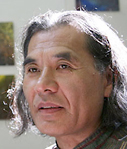
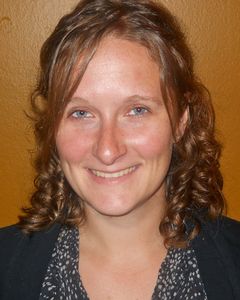
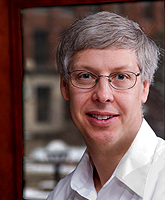 And Orr himself continues to be an extraordinarily innovative teacher. Honored in 2012 with an
And Orr himself continues to be an extraordinarily innovative teacher. Honored in 2012 with an  CRLT's latest Occasional Paper, "Teaching in the Cloud: Leveraging Online Collaboration Tools to Enhance Student Engagement," has just been released. A collaborative effort by CRLT Assistant Director Chad Hershock and U-M Political Science and Philosophy Professor Mika LaVaque-Manty, the paper describes how a wide range of instructors at Michigan use online collaboration tools to enhance student engagement and course management.
CRLT's latest Occasional Paper, "Teaching in the Cloud: Leveraging Online Collaboration Tools to Enhance Student Engagement," has just been released. A collaborative effort by CRLT Assistant Director Chad Hershock and U-M Political Science and Philosophy Professor Mika LaVaque-Manty, the paper describes how a wide range of instructors at Michigan use online collaboration tools to enhance student engagement and course management. 